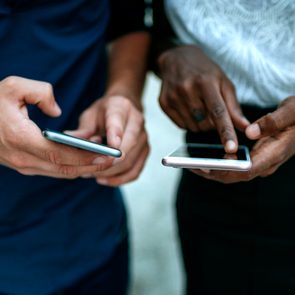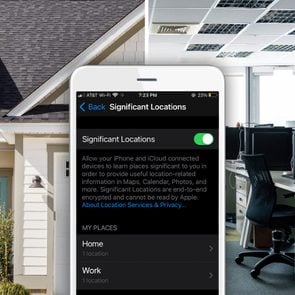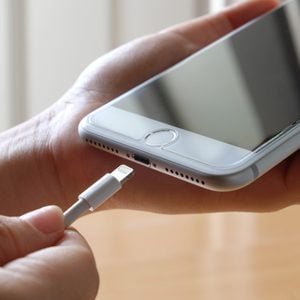I Was Stalked with an Apple AirTag—Here’s What I Wish I’d Known
Updated: Dec. 10, 2022

Tech aimed at making our lives easier is now the perfect stalking tool—and it's terrifying
As someone who’s been around since before the internet and cell phones (yes, I’m prehistoric), I appreciate how technology has advanced and improved our lives. It’s kept us connected—and working—during a global pandemic. It answers even the dumbest questions with a quick “Hey, Siri …” And with Apple’s recently released AirTag, a small Bluetooth- and GPS-enabled device, it ends the hassle of losing your keys or wallet.
Not that misplaced objects have ever been my problem. My ex, on the other hand, was constantly hunting for his lost things. When the Tile tracker came out nearly a decade ago, he was one of the first to place an order. Spoiler: He was an early adopter of Apple’s AirTag too.
I was never going to own one of these devices, but I was going to have to learn how to block and disable an AirTag. Because during a recent trip to Paris, where my ex currently lives, I saw the terrifying side of Apple’s little tracker.
Psst! There’s an AirTag nearby
I touched down in Paris after a long, sleepless flight from Los Angeles, exhausted but excited to see my two kids. They’ve been living with their father in France while he and I navigate an extremely conflictual divorce and custody battle, marred by what I have described as abuse and assault. I try to keep my contact with him to a minimum for my sanity and safety. For the past three years, I’ve picked up the kids after school as soon as I’ve landed in Paris. Their father has the nanny drop off their suitcase with my 12-year-old daughter at school.
Because my 9-year-old son had a slumber party at a friend’s house, my daughter’s best friend was staying the night with us in our hotel. We splashed around in the indoor pool, went to dinner and chatted in my room until bedtime. I was getting ready to go to sleep when my daughter’s friend knocked on the door.
“Maggie, you have to come,” she said. “There’s something in the suitcase!”
It was 11 p.m.
I ran into the adjoining room, where my daughter was digging through the big, black Samsonite. She handed me her iPhone. “It says there’s an AirTag nearby.”
“A what?” I had no idea what she was talking about. It was October 2021, six months after Apple released its new product and weeks before a slew of stalking stories would hit the mainstream. I’d heard about iPhone security issues, but AirTag tracking? Nope. Not yet.
“It’s a tracker. I saw it on TikTok,” my tween explained. “Papa got one a few days ago. It was on the kitchen table, and he told me he was going to use it for his keys.”
I looked at her phone and saw a map that pinpointed our hotel location. My heart started hammering, and my stomach twisted. If my daughter was right, it meant my ex was tracking me—and had been since 4 p.m. that afternoon, when he had the nanny bring the suitcase to school.
The iPhone screen displayed a button that promised to make the AirTag beep. I pressed it, and a muffled chirping rang from the suitcase. My daughter and I tossed out all the clothes and unzipped the luggage lining. Duct-taped to the side of the suitcase was an AirTag.
My daughter peeled off the silver-gray tape and showed me the shiny—and obviously brand-new—device. The size of a quarter, with a smoothly rounded design, it looked sleek and deceptively innocuous. “See, I was right,” she said. “This is the tracker Papa showed me.”
Her best friend sat on the edge of the bed, mouth open. “Things are so exciting around here!”
It’s a crime … right?
There was nothing exciting about finding a tracker in my daughter’s luggage. I was anxious and afraid my ex was spying on me. The iPhone had instructions for how to remove the AirTag battery, which I did immediately. The girls and I discussed throwing the tracker into a trash can on the street, but I wasn’t sure what to do. I was scared, but I’m often scared by my ex’s actions. Maybe disabling the AirTag was enough.
Once the kids were in bed, I texted my American attorney. He was alarmed and told me to file a criminal complaint.
“Really?” I asked.
“Stalking is a serious problem in family court,” he said. “At least it is in the United States. Go file a complaint now!”
I hesitated. It was past midnight, and I didn’t know if I should go to the police station, since it meant leaving the girls alone. In the end, I went to the reception desk and spoke to the security guard on duty. He assured me that if the girls woke up, he would let them know what happened. Otherwise, they were perfectly safe in the hotel.
“Go!” said the guard. “You need to report this. It’s not right.”
Thankful my son was at a friend’s house, I ordered an Uber.
At the police station, I quickly explained what had happened. The officer in charge said he had to call his supervisor for advice. When a crime is committed in France, the police will either take your criminal complaint or, if they don’t think there’s a penal infraction, take a sworn statement called a main courante. These statements are basically your version of events and serve almost no purpose; they carry no legal or criminal weight.
The supervisor told the officer to take the main courante. Apologetic, the officer said, “My supervisor doesn’t know if this is a crime in France.”
I started crying out of sheer despair. “It seems like nothing is a crime here. My ex can lock me out of my house, steal my mattress and cut off my heat and Wi-Fi, and none of that is a crime!”
I’d had to file three mains courantes the previous summer. Although the French police officers told me my ex’s actions amounted to psychological and emotional abuse, they also noted that none of it was technically a crime.
The officer walked away as I kept crying. When he came back several minutes later, his phone was in hand, and he was triumphant. “I found the penal code,” he said, noting the situation was considered an invasion of privacy by the transmission of a person’s location. “My supervisor says I can take the criminal complaint.”
By 3:30 a.m., I had filed the complaint and returned to the hotel. I crawled into bed. This was the second night in a row I wouldn’t be getting much sleep. At 10 a.m. the next morning, my ex sent a text: “Nice hotel … You can’t run from justice.”
I switched hotels the next day, spending hundreds of euros for an extra night’s stay because of the abrupt departure.
I’m not alone
Just as most of us don’t consider cell phone security until our phones have been hacked, I never gave a thought to tracking via electronic device until it happened to me.
While I chalked up my AirTag experience to the abuse I’d been enduring for years, it opened my eyes to the dangers of the seemingly innocent device. I started seeing stories about other women who were stalked with the AirTag. The $29 price—cheap for an Apple product—makes stalking an impulse purchase.
Women have had the disk slipped into their purses and coat pockets or attached to their cars while they were shopping or eating out with friends. They realized they were being tracked when they got a notification on their iPhones, hours after the AirTag was placed. What’s especially frightening is that many women had already returned home before they received a notification, meaning their stalkers were able to find out where they lived.
Law enforcement has been slow to respond, with some police officers refusing to take a report because they don’t believe a crime has been committed. This happened to Sports Illustrated model Brooks Nader when she tried to file a police report about being tracked with an AirTag in early January.
“Unfortunately, the majority of law isn’t even trained in the basics of harassment, stalking and domestic violence,” says author and family court advocate Tina Swithin. “This type of tech adds another layer to abuse that’s hard to prove because it flies just under the radar. It’s next-level, and law enforcement wants to wash its hands of it—and put it into family court—so the officers don’t even take the report.”
Nine months after the tracker’s April 2021 release, Apple finally addressed the creepy ways its tech is being used. The company launched a “personal safety user guide” in January to deal with the rising accounts of people (so far, mostly women) who have been stalked with an AirTag.
Taking steps to stay safe
According to the Centers for Disease Control and Prevention, 7.5 million people are stalked in the United States each year. Women between the ages of 18 and 24, and survivors of intimate partner violence (like me), experience the highest rates of stalking.
Unfortunately, technology like the AirTag and Tile put these women in further jeopardy, but there are some things we can do to stay safe.
- “Trust your gut,” says Swithin. “Women are accused of being paranoid, but don’t doubt yourself. If law enforcement isn’t listening to you, go up the chain of command until you find the right person who’s aligned with you and believes you. They do exist.”
- Review your iPhone privacy settings and learn how to turn off location tracking on your iPhone and Android phone.
- Inspect your bags, coats and luggage. Empty your bag and pockets, especially if you’ve been out. Look in the seams and check the linings to make sure a tracker hasn’t been placed in there.
- Check underneath your bike seat to make sure a tracker hasn’t been attached there.
- Cars have plenty of hiding places, so look behind the license plates, in the wheel wells, beneath the front and rear bumpers, and in the space between the hood and the windshield.
- If you do get an alert or hear the beeping of an AirTag, try to locate it. You can remove the battery by rotating the silver back to open the tracker.
- Get a Bluetooth tracking app or scanner to check for unknown devices, including hidden cameras.
- Report what happened at your local police station, especially if there is a history of harassment and stalking. Apple has said it will cooperate with law enforcement to provide information about unknown AirTags that people find.
Living in the aftermath
It’s been several months since the AirTag incident. I wish I could say things have gone back to normal, but my kids and I are still feeling the aftereffects. Now, every time I pick them up, the first thing they do is go through their suitcases and backpacks, looking for a tracker. My son has been terrorized by nightmares about me being tracked. So far, the French police haven’t followed up on the criminal complaint, and I feel constantly surveilled every time I go back to France. I’ve been researching which Bluetooth scanner to buy so my kids and I can feel a bit more secure.
It just makes me wonder why the safety and rights of women and children take a backseat to a conglomerate’s bottom line—and how law enforcement can turn a blind eye to the sinister, tech-enabled ways violence against women is evolving and being perpetuated.
We’ve been able to find our wallets and keys for centuries without a GPS tracker. Was it really that hard?
Editor’s note: The opinions here belong to the author. To submit your own idea for an essay, email [email protected].
Sources:
- Tina Swithin, author and family court advocate
- Apple: “Personal Safety User Guide for Apple Devices”
- National Network to End Domestic Violence: “Technology-Facilitated Stalking: What You Need to Know”
- The Guardian: “‘I Was Just Really Scared…’ Apple AirTags lead to stalking complaints”
- NBC News: “A tracking device made by Apple is showing up in suspected crimes”
- Centers for Disease Control and Prevention: “National Intimate Partner and Sexual Violence Survey”



